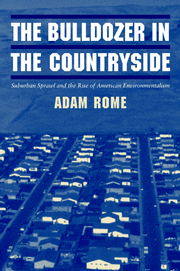Book contents
- Frontmatter
- Contents
- List of Illustrations
- Preface
- Acknowledgments
- Introduction
- 1 Levitt's Progress: The Rise of the Suburban-Industrial Complex
- 2 From the Solar House to the All-Electric Home: The Postwar Debates over Heating and Cooling
- 3 Septic-Tank Suburbia: The Problem of Waste Disposal at the Metropolitan Fringe
- 4 Open Space: The First Protests against the Bulldozed Landscape
- 5 Where Not to Build: The Campaigns to Protect Wetlands, Hillsides, and Floodplains
- 6 Water, Soil, and Wildlife: The Federal Critiques of Tract-House Development
- 7 Toward a Land Ethic: The Quiet Revolution in Land-Use Regulation
- Conclusion
- Selected Bibliography
- Index
- Plate section
7 - Toward a Land Ethic: The Quiet Revolution in Land-Use Regulation
Published online by Cambridge University Press: 05 December 2013
- Frontmatter
- Contents
- List of Illustrations
- Preface
- Acknowledgments
- Introduction
- 1 Levitt's Progress: The Rise of the Suburban-Industrial Complex
- 2 From the Solar House to the All-Electric Home: The Postwar Debates over Heating and Cooling
- 3 Septic-Tank Suburbia: The Problem of Waste Disposal at the Metropolitan Fringe
- 4 Open Space: The First Protests against the Bulldozed Landscape
- 5 Where Not to Build: The Campaigns to Protect Wetlands, Hillsides, and Floodplains
- 6 Water, Soil, and Wildlife: The Federal Critiques of Tract-House Development
- 7 Toward a Land Ethic: The Quiet Revolution in Land-Use Regulation
- Conclusion
- Selected Bibliography
- Index
- Plate section
Summary
On January 1, 1970, President Richard Nixon inaugurated a new decade and a new era by signing the National Environmental Policy Act. The act declared a national interest in protecting and restoring environmental quality, required officials to prepare environmental impact assessments for federal projects, and established a Council on Environmental Quality to advise the president. Seven months later, President Nixon sent the CEQ's first annual report to Congress. The report was “a historic milestone.” For the first time, the president explained, Americans had paused to consider carefully “the state of the Nation's environment.”
The CEQ marveled at the moment. “Historians may one day call 1970 the year of the environment,” the report began. “They may not be able to say that 1970 actually marked a significant change for the better in the quality of life; in the polluting and the fouling of the land, the water, and the air; or in health, working conditions, and recreational opportunity. Indeed, they are almost certain to see evidence of worsening environmental conditions in many parts of the country.” Yet 1970 surely was “a turning point, a year when the quality of life has become more than a phrase; environment and pollution have become everyday words; and ecology has become almost a religion to some of the young. Environmental problems, standing for many years on the threshold of national prominence, are now at the center of nationwide concern.
- Type
- Chapter
- Information
- The Bulldozer in the CountrysideSuburban Sprawl and the Rise of American Environmentalism, pp. 221 - 254Publisher: Cambridge University PressPrint publication year: 2001



